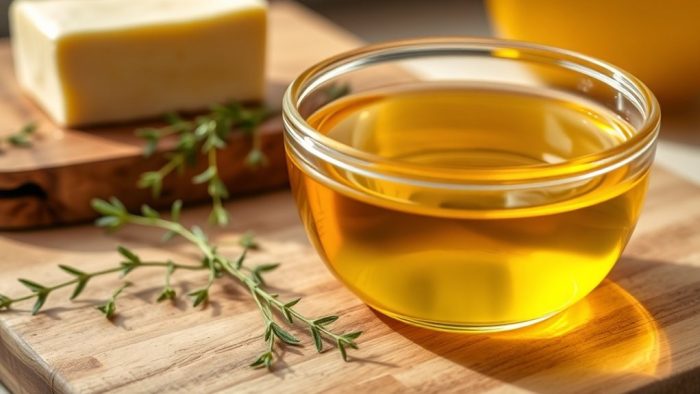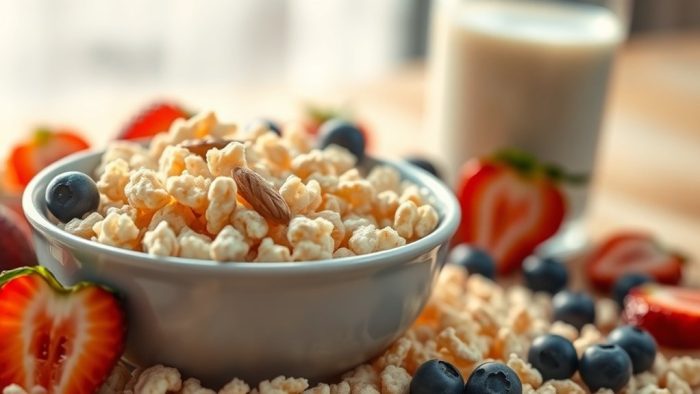Is Molasses Vegan
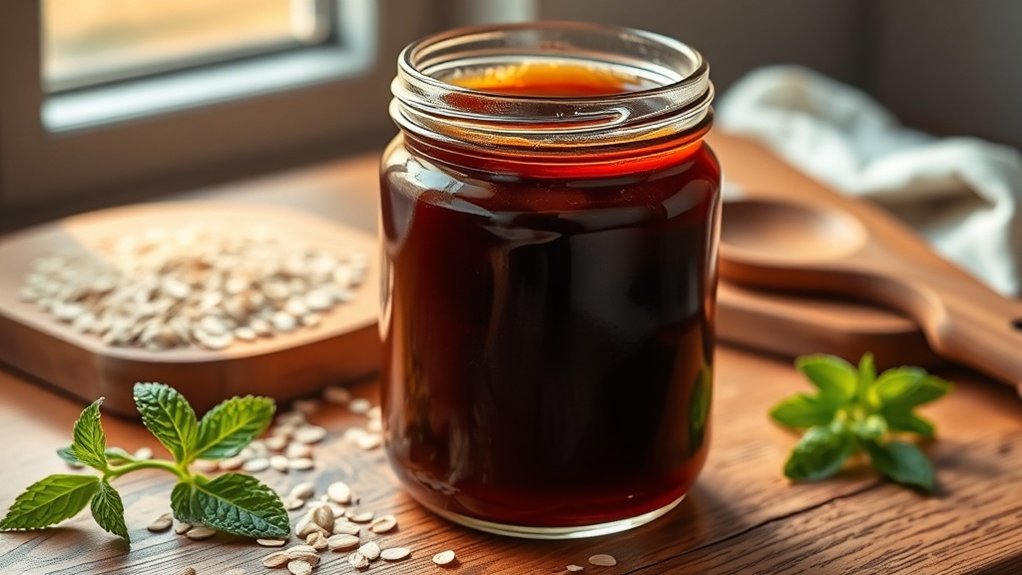
Molasses is generally vegan since it’s a plant-based syrup made from sugarcane or sugar beets. However, you’ll want to check your source carefully—non-organic cane molasses may be processed using bone char (animal bones) during refinement, which some vegans avoid. Organic molasses guarantees no animal-derived processing aids were used, making it the safest choice. Blackstrap molasses offers impressive nutritional benefits, including iron, calcium, and magnesium. Understanding the production methods and certification standards will help you make informed decisions aligned with your dietary values.
What Is Molasses and How Is It Made?
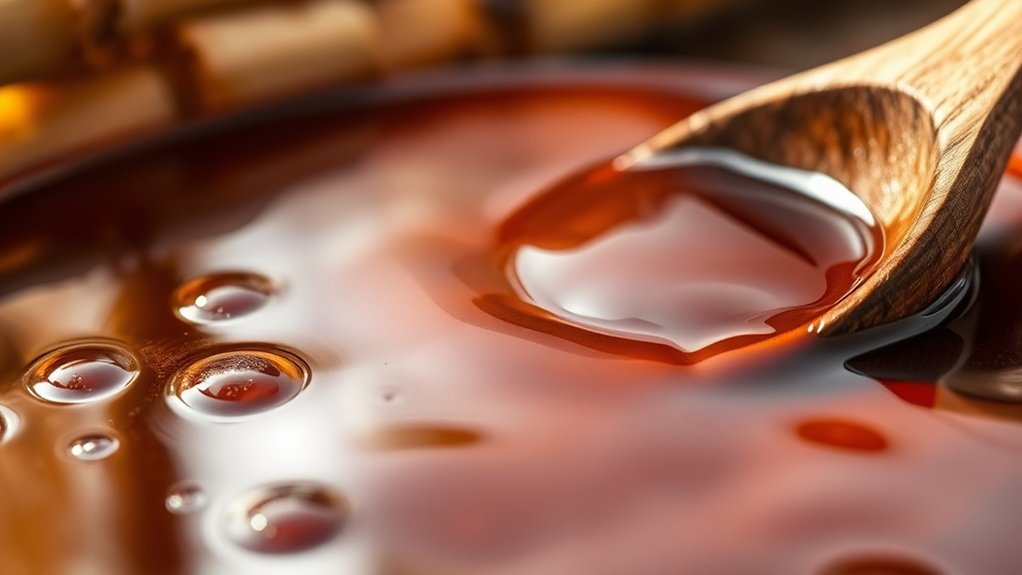
Molasses is a thick, dark syrup created as a by-product during sugar manufacturing, primarily from sugarcane, though sugar beets and grapes serve as alternative sources.
You’ll find this by-product of the sugar industry produced through a specific extraction and boiling process.
The manufacturing begins when sugar cane juice is extracted and boiled repeatedly to crystallize sugar. Each boiling cycle yields different molasses varieties: the first produces light molasses, the second creates dark molasses, and the third results in blackstrap molasses.
During this process, the juice undergoes cooling and separation from sugar crystals after each boil.
Blackstrap molasses, being the most concentrated version, contains the highest mineral content, including calcium, iron, and magnesium, making it particularly valuable for nutritional supplementation.
Understanding the Different Types of Molasses
When you examine the boiling process closely, you’ll uncover that molasses varieties differ markedly in their flavor profiles, nutrient density, and culinary applications.
The different types include light molasses from the first boil, dark molasses from the second, and blackstrap molasses from the third extraction. Light molasses contains higher sugar levels with milder taste, while blackstrap molasses delivers exceptional mineral content—particularly iron, calcium, magnesium, and potassium.
Your vegan considerations depend on sugar production methods. Beet-derived molasses is consistently vegan, but cane molasses may involve bone char filtration.
Organic molasses guarantees vegan status since certification prohibits animal-derived processing aids. If you’re seeking both nutritional benefits and ethical assurance, choosing organic blackstrap molasses provides maximum mineral density while eliminating concerns about bone char processing during manufacturing.
The Sugar Refining Process Explained
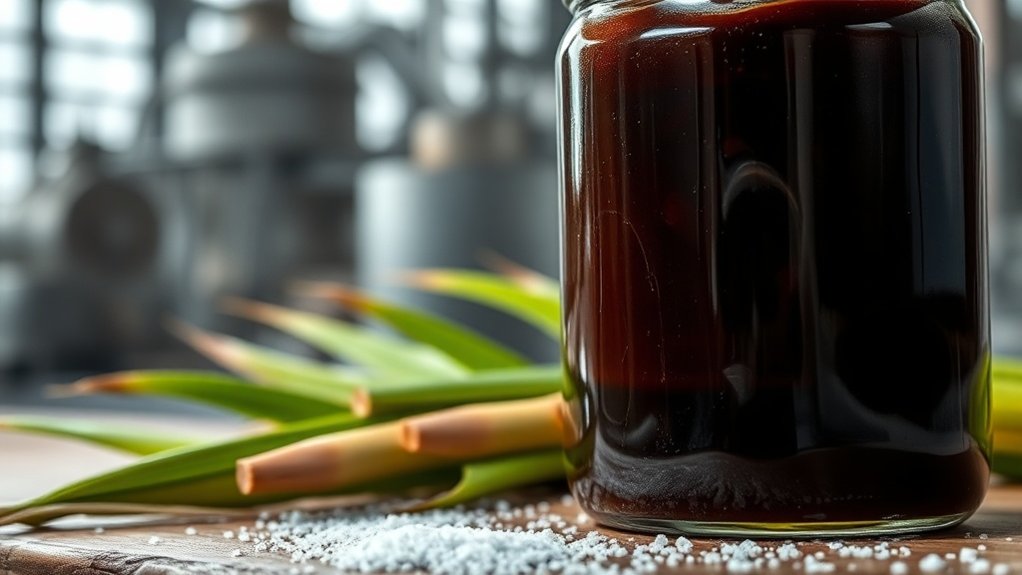
During sugar production, manufacturers extract juice from sugar cane or sugar beets through crushing and pressing. Then, they heat this liquid in large evaporators to concentrate the sucrose content.
The sugar refining process involves three boiling stages: the first produces light molasses, the second creates dark molasses, and the third yields blackstrap molasses—the most nutrient-dense variety.
Here’s where the production process becomes essential for vegans: some refineries use bone char filtration after molasses separation, potentially making conventional cane sugar non-vegan.
However, you can identify vegan-friendly options by checking lot codes starting with 1, 4, or 6, which indicate bone char wasn’t used. Alternatively, organic molasses guarantees vegan status since USDA organic standards prohibit bone char processing, making it your safest choice.
Why Molasses Is Generally Considered Vegan
The fundamental composition of molasses makes it inherently vegan—it’s simply concentrated plant juice with naturally occurring sugars and minerals.
Molasses is generally considered vegan because it’s extracted directly from sugarcane or sugar beets before any controversial refining processes occur. The confusion stems from bone char usage in non-organic cane sugar production, but this filtration happens after molasses separation.
You’ll find that organic molasses provides absolute certainty since USDA regulations prohibit bone char in organic processing. Additionally, molasses derived from sugar beets never encounters animal-derived filtering agents, regardless of organic certification.
If you’re concerned about potential cross-contamination or processing methods, choosing certified organic molasses guarantees your product hasn’t been near animal-derived substances.
This plant-based syrup remains fundamentally suitable for vegan diets when sourced appropriately.
The Bone Char Controversy in Sugar Processing
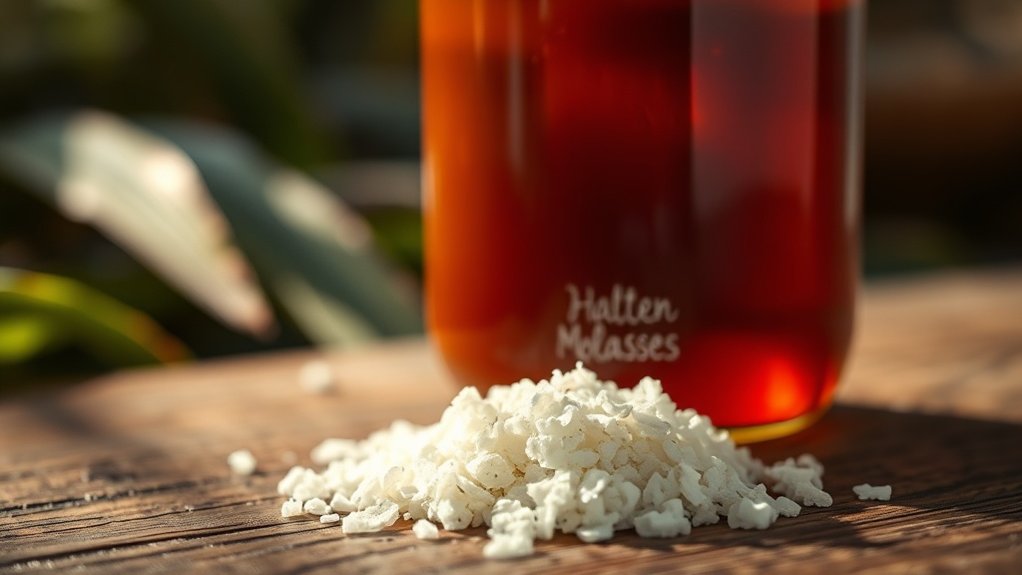
You may not realize that some conventional cane sugar undergoes filtration through bone char—cattle bones heated to high temperatures and used as a decolorizing agent during refining.
This animal-derived processing method creates legitimate concerns about whether products containing such sugar, including non-organic cane molasses, meet strict vegan standards.
Understanding when and how bone char is used in sugar production allows you to make informed purchasing decisions aligned with your dietary principles.
What Is Bone Char?
Bone char emerges as one of the most contentious issues in vegan nutrition, stemming from its widespread use in conventional sugar refining. This substance, also called bone black or animal charcoal, raises significant concerns about hidden animal products in your diet.
Key Facts About Bone Char:
- Production method: Manufacturers create bone char by heating animal bones to extremely high temperatures, producing a porous carbon material.
- Function in sugar processing: Refineries use it specifically to decolorize and filter sugar, removing impurities and achieving that pristine white appearance.
- Vegan alternatives exist: Not all facilities employ this method—some refineries use plant-based filtration systems instead.
To guarantee you’re avoiding bone char, choose certified organic sugar products. Organic processing standards prohibit bone char use, making these options reliably vegan-friendly.
When Bone Char Applies
Understanding when bone char enters the production chain proves crucial for making informed vegan choices about molasses. The sugar refining process employs bone char after extracting sugarcane juice but before molasses production, directly affecting the vegan status of non-organic cane molasses. This filtration method decolorizes and purifies sugar, making any resulting molasses potentially non-vegan.
You’ll find that beet sugar molasses remains inherently vegan since beet processing doesn’t use bone char. However, non-organic cane molasses carries uncertainty about animal-derived processing aids.
Organic molasses offers guaranteed vegan status, as USDA regulations explicitly prohibit bone char in organic sugar refining. You should prioritize USDA-certified organic labels or contact manufacturers directly to verify their processing methods and confirm your molasses aligns with vegan principles.
Avoiding Bone Char Products
Armed with knowledge about bone char‘s role in sugar production, you can take practical steps to guarantee your molasses purchases align with vegan values.
Three Strategies to Avoid Bone Char:
- Choose USDA Organic certified molasses – Organic standards prohibit bone char filtration, making certain your cane sugar-derived molasses remains authentically vegan without animal-derived processing aids.
- Select beet sugar molasses – This variety bypasses bone char concerns entirely, as beet sugar processing never employs animal-based filtration methods.
- Check lot codes on non-organic products – When purchasing processed cane sugar molasses, look for lot codes beginning with 1, 4, or 6, which typically indicate vegan-friendly processing facilities.
These evidence-based approaches empower you to make informed purchasing decisions that support your ethical commitments while enjoying molasses’s nutritional benefits.
Nutritional Benefits of Molasses for Vegans
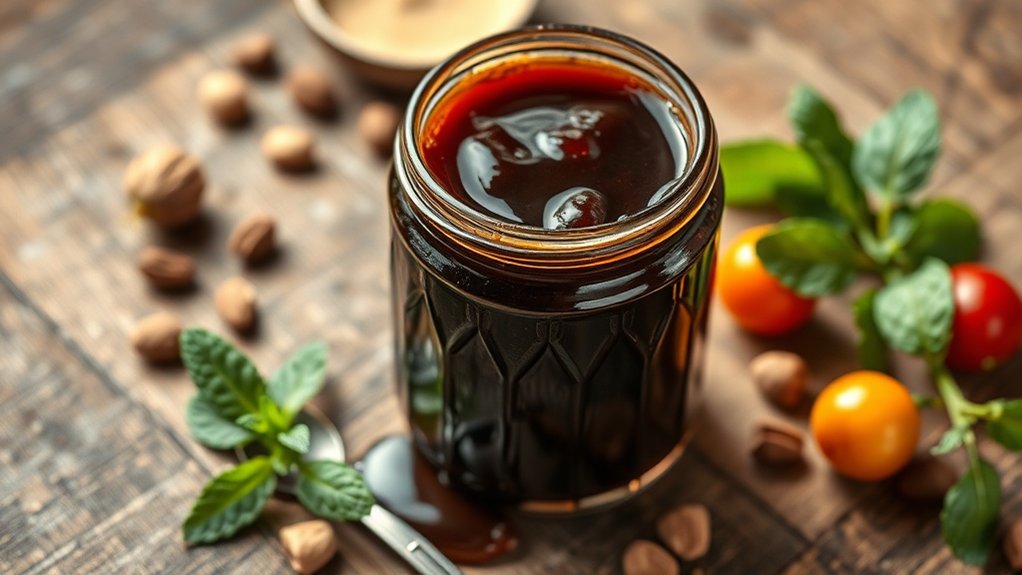
Blackstrap molasses stands out as a nutritional powerhouse for plant-based eaters, delivering concentrated amounts of minerals that can be challenging to obtain from vegan sources alone.
You’ll get 20% of your daily calcium needs and up to 3 mg of iron per tablespoon—critical nutrients that require careful attention in a vegan diet.
Beyond these essential minerals, blackstrap molasses provides magnesium, potassium, selenium, and antioxidants that support your metabolic health while combating oxidative stress.
It’s particularly valuable as a sweetener because it offers a lower glycemic index than table sugar, helping you manage blood sugar levels more effectively.
Organic Vs Non-Organic Molasses: What’s the Difference?
When choosing molasses for a vegan diet, you’ll find that organic certification provides essential assurance about processing methods.
USDA Organic certified molasses guarantees no animal-derived products like bone char were used during production, while non-organic cane molasses may involve bone char filtration—a practice that compromises its vegan status.
Understanding this certification distinction empowers you to make informed purchasing decisions, particularly since beet molasses remains vegan regardless of organic status due to fundamentally different processing techniques.
Bone Char Processing Differences
The primary distinction between organic and non-organic molasses lies in their processing methods, specifically whether bone char—a decolorizing filter made from animal bones—is used during sugar refining.
Understanding these processing differences helps you make informed decisions about vegan status:
- Non-organic cane sugar molasses may undergo bone char filtration, potentially containing trace animal by-products that compromise its vegan classification.
- Organic molasses carries USDA certification guaranteeing no animal-derived processing methods, making it reliably vegan.
- Beet sugar molasses never requires bone char processing, rendering it naturally vegan regardless of organic status.
When selecting molasses, you’ll find that organic certification provides the clearest assurance of vegan compliance.
While beet sugar varieties offer inherent vegan properties, organic cane sugar molasses eliminates any uncertainty about animal product involvement during manufacturing.
Guaranteed Vegan Certification Status
How can you definitively confirm molasses meets vegan standards? You’ll need to look for USDA Organic labels, which guarantee cruelty-free processing without bone char filtration.
Organic molasses can’t legally be processed using animal-derived materials, making it your safest vegan choice.
Non-organic molasses presents complications, particularly cane-derived varieties that may undergo bone char refinement.
However, beet sugar molasses remains consistently vegan regardless of organic status, as manufacturers never use bone char in beet sugar processing.
For absolute certainty, seek products displaying explicit vegan certification alongside organic designations.
When purchasing non-organic molasses, you must verify the manufacturer’s specific processing methods, as practices vary between facilities.
Contact producers directly if packaging doesn’t clarify their refining techniques, making sure your selection aligns with vegan principles.
How Molasses Compares to Other Liquid Sweeteners
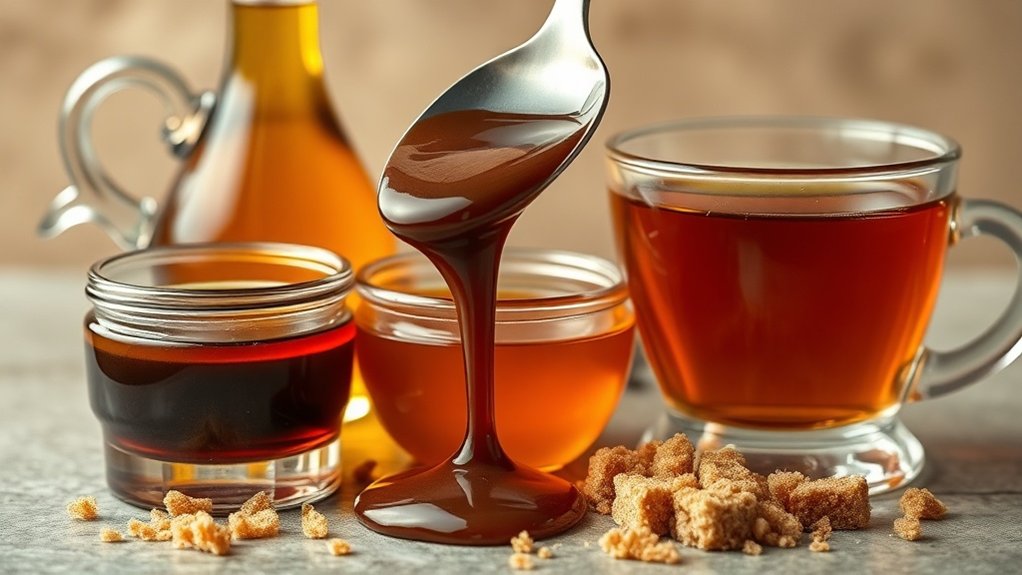
Among liquid sweeteners, molasses stands distinctly apart in both nutritional profile and culinary applications. When you’re choosing vegan sweeteners, understanding these differences becomes essential for both ethical eating and ideal nutrition.
Key distinctions include:
- Nutritional density: Unlike honey or maple syrup, blackstrap molasses delivers exceptional iron and calcium content, making it nutritionally superior for plant-based diets requiring mineral supplementation.
- Vegan status: While honey isn’t vegan due to bee exploitation, molasses from organic sugar production remains completely plant-derived and ethically sound for strict vegans.
- Glycemic impact: Molasses produces lower blood sugar spikes compared to conventional sugar and most liquid sweeteners, offering better metabolic control.
You’ll need to adjust recipes carefully, as molasses’s distinctive thickness and robust flavor profile differ greatly from lighter sweeteners like agave or corn syrup.
Best Vegan Molasses Brands and Products
When selecting vegan molasses, you’ll find that certified organic options like Wholesome Sweeteners and Azure Market provide the highest nutritional value, with iron content ranging from 3 to 4.7 mg per tablespoon.
These USDA organic certifications guarantee no animal-derived processing agents were used during production, eliminating concerns about bone char filtration that sometimes affects conventional sugar products.
Manufacturers like Fermentaholics and Plantation also offer reliable organic, unsulphured blackstrap varieties that meet strict vegan standards while delivering essential minerals like iron, calcium, and potassium.
Certified Organic Molasses Options
Choosing USDA certified organic molasses guarantees you’re getting a vegan-friendly product, since organic certification explicitly prohibits bone char processing during refinement.
These cruelty-free products are sourced through organic practices while delivering impressive nutritional profiles.
Top Certified Organic Molasses Options:
- Wholesome Sweeteners Organic Blackstrap Molasses – Fair trade certified with 3 mg iron per tablespoon, making it an excellent choice for plant-based diets.
- Azure Market Organic Molasses – Stands out with the highest iron content at 4.7 mg per tablespoon, ideal for those prioritizing mineral intake.
- Fermentaholics Organic Unsulphured Blackstrap Molasses – Provides 3 mg iron per serving with strict organic certification, making certain quality and ethical sourcing.
Each option meets stringent organic standards while supporting your vegan lifestyle and nutritional goals.
Reliable Vegan-Friendly Manufacturers
Several manufacturers have established themselves as consistently reliable sources for vegan molasses products, with transparent processing methods that exclude animal-derived filtering agents.
Wholesome Sweeteners leads the market with their Fair Trade Certified Organic Blackstrap Molasses, delivering 3 mg of iron per tablespoon alongside their commitment to ethical sourcing and bone char-free production.
Azure Market offers an exceptional nutritional profile at 4.7 mg of iron per tablespoon in their organic variety, while Fermentaholics provides USDA-certified organic unsulphured blackstrap molasses with competitive iron content at 3 mg per serving.
Plantation rounds out reliable manufacturers with their organic unsulphured option at 1.5 mg iron per tablespoon.
For vegetarians comfortable with non-organic options, Grandma’s Original Molasses confirms processing without bone char, making these brands consistently vegan-friendly choices.
Culinary Uses and Recipe Applications for Vegan Molasses
Beyond its nutritional benefits, molasses serves as a powerhouse ingredient in both sweet and savory vegan cooking. When your recipe calls for depth and complexity, vegan molasses delivers remarkable versatility across culinary creations.
Key Applications for Baking and Cooking:
- Sweet Baking: You’ll find molasses essential in gingerbread, spice cookies, and fruitcakes, where its rich, smoky notes create distinctive flavor profiles that define these classic treats.
- Savory Dishes: Incorporate it into baked beans and BBQ sauces to achieve balanced sweetness and improved complexity in plant-based proteins and side dishes.
- Beverages: Mix with hot water or steamed plant milk for nourishing warm drinks.
Blackstrap molasses requires careful measurement adjustments due to its concentrated flavor. Pair it with cinnamon, raisins, and nuts to maximize its potential in diverse vegan recipes.



